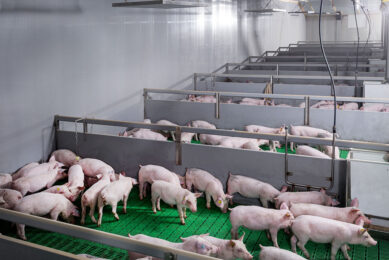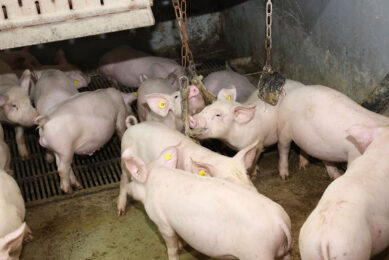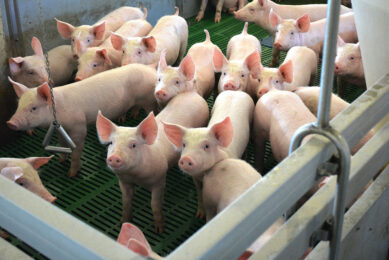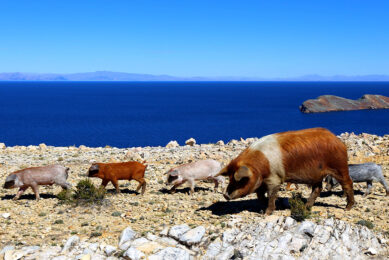Stress control in pigs: introduce a rabbit!
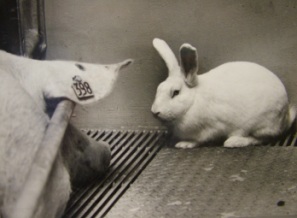
For the pork producer, the top priorities are growth and feed conversion. But managing a finishing pig operation requires more than just providing good feed. Raising healthy, peaceful pigs is at least as important, and the livestock manager can also have a great deal of control over these aspects. Keeping the stress (aggression) under control is an important part in this.
By Emmy Koeleman
Preventing stress is also important for the offspring. Researchers at the USDA have found that if a pregnant pig, for example, is stressed, profound changes occur in the offspring’s physiology and behaviour that can affect producers’ income. These include higher levels of the hormone cortisol, which indicate stress, and slow wound healing.
Many studies have been carried out to measure stress in pigs and to find solutions to keep the stress to a low level. Researchers from the Veterinary Faculty at University Utrecht in the Netherlands studied (already a few years ago – 1995) the effects of a Specific-Stress-Free (SSF) housing system on productivity, health, and welfare of pigs. This SSF system was compared to a conventional housing system with the same climatic conditions.
Experiment set up
Two identical experimental rooms with five pens each were used. In each room five litters were used for the experiments. The SSF pigs were not mixed or transported, whereas the pigs in the conventional housing system were mixed at weaning and mixed and transported at 25 kg. Average daily gain for the SSF pigs was higher both for the rearing period and for the finishing period. Live weight at 143 d was, therefore, higher in the SSF group (95.09 kg versus 84.8 kg). Clinical signs were hardly seen in the SSF group, but in the control group high levels of aggression after mixing caused ear, skin, and tail lesions. In this particular study it was obvious that production performance, health, and welfare were improved when pigs are kept in an SSF housing system where they are not mixed or transported.
Some solutions
Housing and handling such as in the SSF systems are important parameter, but what else can be down to prevent or limit the stress? Of course, the first measure to reduce stress among the animals is to make sure the preconditions are OK, the housing, ventilation, stall occupancy, feed and water and proper health care and animal handling. In addition, alert observation during the inspection rounds is very important. Is the daily gain too slow? Do you see an arched back or tear staining on the snout? Are the pigs agitated? These signals can indicate problems. Furthermore, some measures can be taken to further reduce the aggressiveness and thus stress in the pig stall.
Feeding tryptophan
Feeding the amino acid tryptophan to young female pigs as part of their regular diet makes them less aggressive and easier to manage. The tryptophan-enhanced diet reduced aggression and overall behavioural activity among young female pigs during the 8-month study. Tryptophan, which is only acquired through diet, is the precursor for the calming cerebral neurotransmitter serotonin.
A rabbit!
Another very nice measure I once saw in a Dutch article (about 10 years ago) was keeping a rabbit with the sow and piglets. Sows, especially primiparous, may show aggressive behaviour at parturition against their own piglets, resulting in wounding or death of the piglets. A rabbit seems to have “special skills” to protect the piglets from their aggressive mom. Haven’t seen this in any country though and also not on Dutch farms recently, but it might be worthwhile to look into these ninja rabbits again.©



